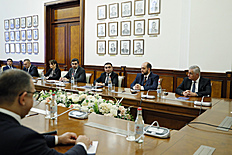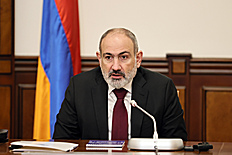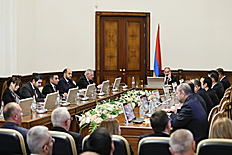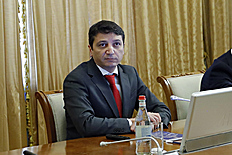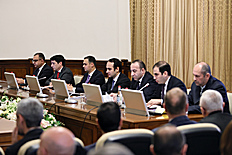Press releases
Activity report 2023 of the Ministry of Finance presented to the Prime Minister
more 3 photos
Prime Minister Nikol Pashinyan visited the Ministry of Finance to participate in the discussion of the activity report 2023 of the ministry. Deputy Prime Ministers Mher Grigoryan and Tigran Khachatryan, Chief of Staff of the Prime Minister Arayik Harutyunyan, Head of the State Supervision Service Romanos Petrosyan, officials of the Prime Minister's Office, and the leadership staff of the Ministry of Finance participated in the discussion.
At the beginning of the discussion, the Prime Minister noted that the discussions of the activity reports of the ministries for the year of 2023 starts from the Ministry of Finance.
Minister of Finance Vahe Hovhannisyan, Deputy Ministers of Finance and the Secretary General made reports.
Referring to the implemented programs, it was noted that the role of scenario analysis in macroeconomic forecasts has been increased. In the conditions of the current turbulence, alternative macroeconomic and fiscal frameworks were developed, on the basis of which the budget reserves were formed, the path necessary to ensure the economic growth target was assessed, including the necessary investment and export volumes, the key directions of structural reforms: public administration reforms, digitalization and public investment management system. The system of forecasting tax revenues has been improved, supplementing them with modern models, which allowed to publish major tax forecasts in the budget message for 2024.
Analyzes and forecasts were presented, according to which the Government's target of 7% economic growth requires the implementation of targeted structural policies, which will stimulate private investment and exports, increasing productivity.
During the passing year, the optimal debt thresholds for the Armenian economy and the optimal speed of improving the AMD debt share were re-evaluated. The tax potential assessment methodology has been developed. The socio-economic consequences of the implementation of the key measures of the Government Action Plan were assessed.
An impact assessment of the integration of the forcibly displaced population from Nagorno Karabakh was carried out.
Presenting the upcoming programs, it was noted that a new comprehensive tool will be developed in order to improve the system of medium-term macroeconomic forecasts. The tax revenue forecasting system will be supplemented with new tools by harmonizing the models developed at different stages. It is also planned to introduce a comprehensive fiscal risk management methodology and report, continuous implementation of analyzes and diagnoses dedicated to sectoral and individual problems, including impact assessment of programs for the integration of the forcibly displaced population of NK, development of a new system for assessing the potential of the economy.
Work will also be carried out to increase the weight of medium-term bonds against the backdrop of declining interest rates. It is also planned to carry out partial redemption of Eurobonds, reduction of refinancing and exchange rate risks.
In order to increase the addressability of cooperation with international structures, it is planned to attract support aimed at ensuring macroeconomic stability, promoting sustainable and inclusive economic growth, and implementing reforms in key areas. Activities aimed at capacity development and experience sharing will also be implemented.
Measures were taken for strengthening Armenia’s position in the global financial market, and the following results were recorded: During 2023, the sovereign rating of Armenia by "Fitch" and "Standard and Poor's" agencies was raised by one level and the rating perspective by "Moody's" agency was improved, proper representation of Armenia on international platforms was achieved, Armenia’s rating in the international financial world was stengthened, raising the rating.
In order to improve the international cooperation system, it is planned to organize the 2024 meeting and business conference of the EBRD Board of Governors in Yerevan. Events will be organized with the participation of international partners: donors’ conferences, conferences with bilateral partners and events for the exchange of experience.
Referring to the subsidy programs, it was mentioned that it is planned to define the mechanisms of providing subsidies to the communities from the state budget of Armenia. Starting from 2024, subsidies will be provided to the communities for the implementation of programs formed on a participatory basis (2024: 500 million AMD). Subsidies for programs formed on a participatory basis will be allocated to 4 communities.
It was reported that within the framework of securing additional tax revenues, excise tax rates were increased for 2024-2026. As part of the improvement of the business environment, the tax environment of economic entities using the state support programs of the agricultural sector will be improved.
During the reporting period, the system of universal declaration of incomes of individuals was approved. In order to ensure the implementation of the latter, a definition of individual types and sizes of social expenses was carried out.
It was noted that works aimed at effective balance of speed and quality of the procurement system have been carried out. Methodological support was provided to 1,540 processes during the year, the one-person purchase procedure was reformed, etc. For the purpose of capacity building, 614 specialists of the Ministry were trained. As a result, a significant reduction was recorded in the cases of purchasing from one person on the basis of urgency. In January-October 2023, compared to the same period last year, the role of such purchases decreased by 4.4 percentage points, making 5.2 percent, compared to 9.6 percent last year.
Improvement of the digital system, development of capabilities, development of analytical tools are planned within the framework of upcoming programs. As for fiscal risk management, the department in charge was reorganized, and the primary directions of fiscal risks were defined. It is planned to continue the development of analytical capabilities and tools, assessment of long-term fiscal sustainability, etc.
Nikol Pashinyan emphasized the importance of the works and reforms and drew the attention of the ministry's staff to a number of key issues. In particular, the Prime Minister referred to subsidy programs, tax policy, the fight against shadow economy, the development of the capital market, the continuous improvement of Armenia's position in international rankings, the implementation of public-private sector cooperation programs and other topics. The Prime Minister emphasized the effective and consistent implementation of the works in the above-mentioned directions, gave instructions to the officials on what to do next.

